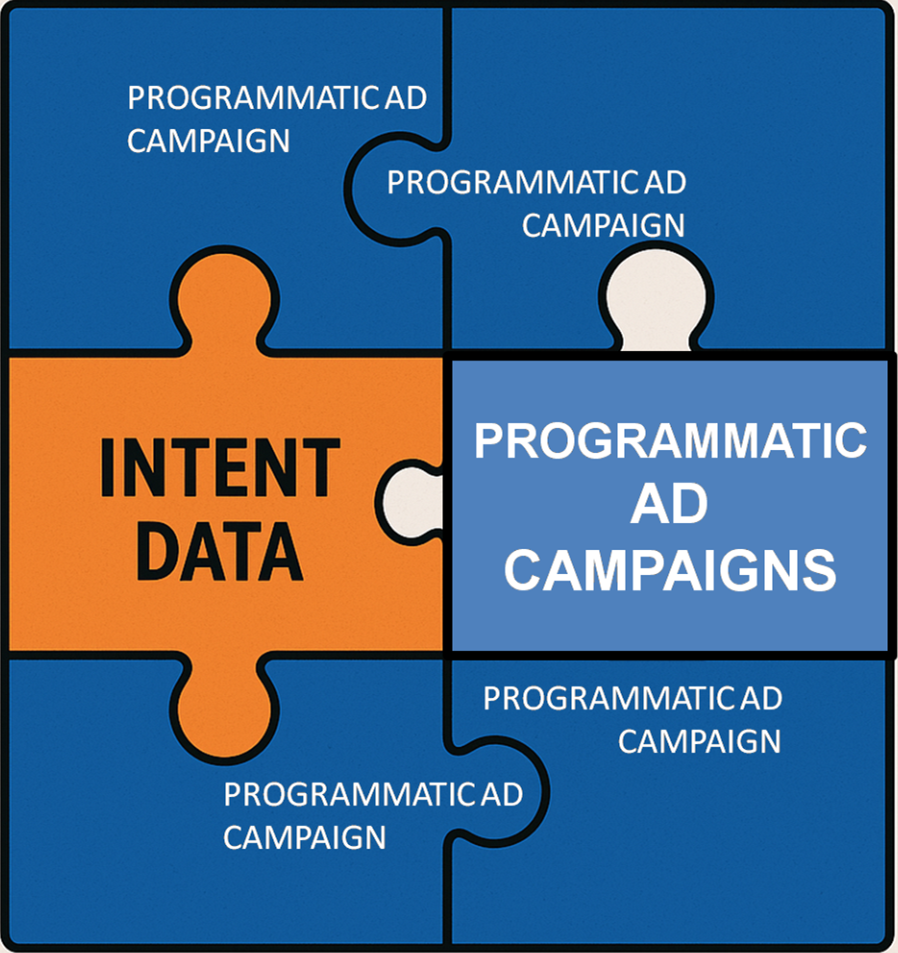Browse Blog:

Are You Seeing These Gaps in Your Programmatic Strategy?
Despite investing time and budget into your programmatic campaigns, are you finding that engagement rates aren’t meeting expectations? Maybe your CTRs are low, conversion rates are sluggish, or your sales team complains about the quality of inbound leads. If that resonates, you're likely missing a crucial ingredient that makes your ads relevant, timely, and profitable: buyer intent.
Many marketers optimize their programmatic ad campaigns based on personas, job titles, and firmographic filters. But these static attributes can’t tell you when someone is actually ready to buy. That’s the gap intent data fills. It's the missing piece of the puzzle that elevates your strategy from generic targeting to high-precision engagement.

Intent data captures digital footprints left behind by potential buyers. It includes signals such as keyword searches, content downloads, and site visits—all pointing to active interest in topics related to your solution. Instead of just knowing your ideal customer persona, you now also know when they’re researching and why.
Traditional targeting within programmatic systems is limited to demographic and firmographic filters. You can reach supply chain heads at enterprise firms, but without intent data, you don't know if they're actually looking for a logistics solution. Intent adds dynamic context to your static segmentation.
This behavioral insight transforms your marketing in three essential ways:
• First, it reveals hidden demand beyond your CRM. Many accounts actively researching a solution may not yet be on your radar. Intent data surfaces these early-stage prospects, allowing you to influence them before competitors do.
• Second, it enhances your timing. By identifying when a buyer is in-market, you avoid spending budget on accounts that aren't ready and focus on those primed for engagement.
• Third, it enables next-level personalization. You can align messages with actual buyer interests instead of vague assumptions, making your ads more relevant and harder to ignore.
B2B buyers are increasingly independent. They prefer self-directed research and may consume dozens of content pieces before ever filling out a form. Unfortunately, that behavior happens off your radar if you’re relying only on first-party data.
Intent data tracks this anonymous research journey across third-party sources. Whether it’s reading comparison blogs, attending webinars, or reviewing peer feedback, these signals highlight where buyers are in their journey, and what they're hungry to learn.
For example, if you're promoting an inventory management platform and your usual campaign targets generic supply chain professionals, you may miss a surge in interest from niche verticals like mid-sized food distributors. Intent data shows who’s actively looking for “cold chain tracking” or “demand forecasting tools,” allowing you to pivot your messaging in real time.
By doing this, your programmatic strategy isn’t just reactive, it becomes predictive.
One of the main attractions of programmatic advertising is its scale. But scale without focus leads to wasted impressions and generic messaging. Intent data enables you to scale with precision.
Instead of treating every buyer persona equally, you can tier your audiences based on their intent intensity. Accounts showing low activity get awareness-stage content (TOFU content), while high-intensity accounts receive solution comparisons or demo offers.
You also reduce media waste by excluding inactive accounts or suppressing audiences that haven’t exhibited any buying behavior in weeks. This data-driven discipline boosts your ROI by allocating spend only where interest is heating up.
Even better, you can integrate intent data with your first-party sources—like your marketing automation platform—to form richer segments. These compound signals help prioritize who’s truly worth your ad dollars.
No matter how creative your message is, it won’t land if it reaches the buyer too early—or too late. Intent data removes the guesswork by identifying when accounts enter active research mode.
This intelligence allows you to align campaign content with the buyer’s current mindset. Someone in the early research stage might respond better to thought leadership articles, while a buyer evaluating vendors could click on a comparison guide or ROI calculator.
You also gain agility. If interest surges unexpectedly in a new industry or region, you can quickly pivot your campaign strategy to capitalize on it. That responsiveness gives you a competitive edge.
Ultimately, timely engagement builds trust faster. And in B2B, trust is everything.
B2B marketers have long strived for personalization, but achieving it at scale felt impossible—until now. Intent data gives you the signals needed to personalize not just by persona, but by real-time behavior.
For instance, say you market a fintech solution. Instead of promoting general “financial automation” benefits, you see that mid-market CFOs are increasingly searching for “invoice reconciliation tools.” Armed with this insight, your programmatic ad delivers an offer for an in-depth eBook on that exact topic.
This level of specificity resonates more, because it addresses pain points buyers are already thinking about. Personalization becomes less about segmenting and more about syncing with buyer curiosity.
Intent data doesn’t just help marketing—it accelerates sales.
When leads demonstrate strong intent, they can be passed to sales teams with higher confidence. SDRs can prioritize outreach to accounts most likely to convert, using the topics they’ve researched as conversation starters.
This leads to:
• Higher-quality conversations
• Faster lead-to-opportunity conversion
• Shorter sales cycles
Sales teams waste less time chasing cold leads, and marketing proves its value with tangible revenue impact.
Refer blog on how sales boost with SDR-as-a-service.
With marketing budgets under constant pressure, every ad dollar must perform. Intent data helps ensure that your spend is optimized toward accounts most likely to engage.
You can:
• Increase bids on high-intent accounts
• Pause or lower bids on inactive ones
• Shift resources as new interest trends emerge
Rather than sticking to rigid media plans, you gain the flexibility to adjust in real time. That kind of agility not only improves campaign performance but also helps justify further investment.
Programmatic campaigns aren’t “set it and forget it.” They should evolve—and intent data gives you the insight to improve continuously. As you track which topics drive the most engagement, you can adapt creative assets, optimize landing pages, and even inform broader content strategy.
Campaigns that once relied on quarterly reviews can now evolve weekly or even daily. You’re not just reacting to results—you’re learning from them, gaining insights from them.
Intent data fosters tighter alignment between marketing and sales. With shared access to account-level intent signals, both teams can prioritize the same accounts, align messaging, and coordinate follow-ups.
This unified motion improves the buyer experience. Prospects don’t feel like they’re moving between disconnected teams. Instead, they encounter consistent, relevant interactions from awareness to decision.
Sales close more deals. Marketing earns more credit. Everybody wins.
Without intent data, your campaigns operate in the dark. You may reach the right personas, but at the wrong time, with the wrong message, and zero buying intent. This leads to:
• Inflated cost per lead
• Poor engagement rates
• Missed opportunities with active buyers
• Slower pipeline progression
In today’s buyer-led environment, that’s not just inefficient, it’s dangerous.
Intent data is not a buzzword. It’s a paradigm shift in how B2B marketers identify, engage, and convert high-value accounts. When paired with programmatic advertising, it enables a level of precision, relevance, and efficiency that static targeting simply cannot match.
Whether you’re building awareness or accelerating pipeline, intent-led campaigns give you the power to make every impression count.
Should you want to unlock high-intent buyers and drive smarter results? Connect with S2W Media to learn how intent-driven programmatic can transform your ABM strategy. Contact us today to activate buyer-ready signals and turn engagement into action.
Unlock higher ROI and pipeline acceleration with intent data-driven programmatic campaigns. Discover how real-time signals can transform your ABM strategy. Are You Seeing These Gaps in Your Programmatic Strategy?